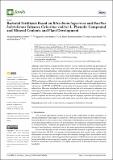Por favor, use este identificador para citar o enlazar a este item:
http://hdl.handle.net/10261/236721COMPARTIR / EXPORTAR:
 SHARE SHARE
 CORE
BASE CORE
BASE
|
|
| Visualizar otros formatos: MARC | Dublin Core | RDF | ORE | MODS | METS | DIDL | DATACITE | |

| Título: | Bacterial fertilizers based on rhizobium laguerreae and bacillus halotolerans enhance cichorium endivia l. Phenolic compound and mineral contents and plant development |
Autor: | Jiménez-Gómez, Alejandro; García-Estévez, Ignacio; Escribano Bailón, M. Teresa; García-Fraile, Paula CSIC ORCID; Rivas, Raúl CSIC ORCID | Palabras clave: | Phenolic acids Escarole Bioactive compounds Biofertilizers Flavonols |
Fecha de publicación: | 2021 | Editor: | Multidisciplinary Digital Publishing Institute | Citación: | Foods 10(2): 424 (2021) | Resumen: | Today there is an urgent need to find new ways to satisfy the current and growing food demand and to maintain crop protection and food safety. One of the most promising changes is the replacement of chemical fertilizers with biofertilizers, which include plant root-associated beneficial bacteria. This work describes and shows the use of B. halotolerans SCCPVE07 and R. laguerreae PEPV40 strains as efficient biofertilizers for escarole crops, horticultural species that are widely cultivated. An in silico genome study was performed where coding genes related to plant growth promoting (PGP) mechanisms or different enzymes implicated in the metabolism of phenolic compounds were identified. An efficient bacterial root colonization process was also analyzed through fluorescence microscopy. SCCPVE07 and PEPV40 promote plant development under normal conditions and saline stress. Moreover, inoculated escarole plants showed not only an increase in potassium, iron and magnesium content but also a significant improvement in protocatechuic acid, caffeic acid or kaempferol 3-O-glucuronide plant content. Our results show for the first time the beneficial effects in plant development and the food quality of escarole crops and highlight a potential and hopeful change in the current agricultural system even under saline stress, one of the major non-biological stresses | Descripción: | 13 páginas, 5 tablas, 1 figura | Versión del editor: | http://dx.doi.org/10.3390/foods10020424 | URI: | http://hdl.handle.net/10261/236721 | DOI: | 10.3390/foods10020424 | E-ISSN: | 2304-8158 |
| Aparece en las colecciones: | (IRNASA) Artículos |
Ficheros en este ítem:
| Fichero | Descripción | Tamaño | Formato | |
|---|---|---|---|---|
| Bacterial fertilizers based on rhizobium.pdf | Artículo principal | 3,22 MB | Adobe PDF |  Visualizar/Abrir |
CORE Recommender
PubMed Central
Citations
5
checked on 12-abr-2024
SCOPUSTM
Citations
14
checked on 17-abr-2024
WEB OF SCIENCETM
Citations
13
checked on 26-feb-2024
Page view(s)
125
checked on 17-abr-2024
Download(s)
126
checked on 17-abr-2024

